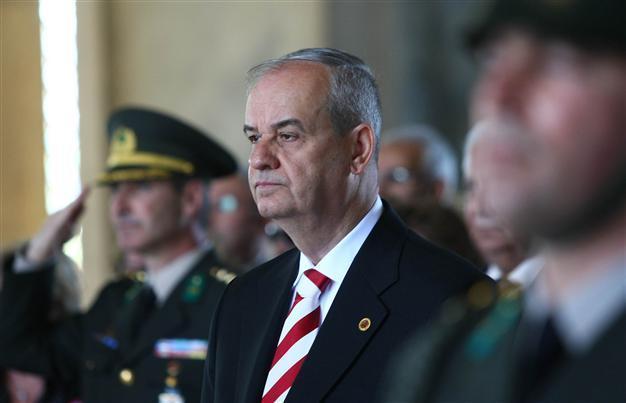Former army chief's jailing a rights violation: Top Turkish court
ANKARA

Turkey's former top soldier, İlker Başbuğ, could soon be free as a result of the Constitutional Court's ruling.
The Constitutional Court on March 6 has ruled in favor of a complaint filed by Turkey’s former chief of staff, retired Gen. İlker Başbuğ, who was sentenced to life imprisonment last year in the Ergenekon coup trial, on the grounds that his legal rights were violated.
“After this verdict, İlker Başbuğ should not stay even a minute in jail,” Metin Feyzioğlu, head of the Turkish Bar Association told the private CNNTürk March 6 in reference to the Constitutional Court decision. “Turkey is experiencing difficult days. In this framework, the verdict issued by the Constitutional Court is important. The decision will not [only] free İlker Başbuğ, but also the captive consciences of the judges who arrested him.”
Başbuğ’s claim that he was unlawfully deprived of freedom was rejected by a local court without being “effectively examined, and the detailed reasoning regarding his conviction was not issued,” the Constitutional Court said, adding that, for that reason, his conviction could not be the subject of any case at the Supreme Court of Appeals.
The top court’s decision was welcomed by many opposition politicians who said it proved the baselessness of the controversial Ergenekon and “Balyoz” (Sledghammer) cases in which prominent military and civilian officials were convicted on charges of plotting against the government.
“The decision given by the Constitutional Court is important,” Parliamentary Speaker Cemil Çiçek told daily Hürriyet. “This decision following the ones on arrested lawmakers will help the judiciary fall into place. This is also important in terms of the functions of justice. Nothing can be reached by ignoring justice. Politics that does not take its power from the law has no chance.”
Akif Hamzaçebi, deputy parliamentary group leader of the Republican People’s Party (CHP), also welcomed the decision but said it should be counted as evidence of huge mistakes committed during the Ergenekon trial. Hamzaçebi underlined that the court’s decision said preventing the Ergenekon suspects from enjoying their right to appeal was unlawful.
Başbuğ, Turkey’s 26th chief of General Staff, was arrested Jan. 5, 2012 on charges of being the leader of a terrorist organization aimed at toppling the democratically elected government. Başbuğ’s numerous appeals for his release pending trial were left unanswered by local courts over the last two years. His arrest was the symbolic development in breaking the military’s tutelage over the political sphere, especially in the course of the much debated Ergenekon and Balyoz cases in which hundreds of senior high-ranking former and on-duty officers were tried.
The Constitutional Court said Başbuğ had been unable to appeal to the Supreme Court of Appeals as the local court handling his case failed “to effectively examine his case and issue the detailed ruling on his sentence.” The ruling was adopted unanimously by the panel of judges.
The ruling could pave the way for Başbuğ’s release. Similar Constitutional Court rulings have facilitated the release of jailed lawmakers from the CHP and Peace and Democracy Party (BDP), and more recently, an Ergenekon convict receiving cancer treatment.
“There should now be a ruling on Başbuğ’s release,” his lawyer, İlker Sezer, told daily Hürriyet in his first comments on the Constitutional Court’s decision.
The Constitutional Court also sent a copy of its decision to the local court that reviewed the application for Başbuğ’s release.
In Başbuğ’s conviction, the court did not reveal its reasoning and decided to keep Başbuğ in detention as a precaution until the reasoning was released.
Başbuğ had also filed a demand for his release as part of an initiative for the retrial of coup case suspects, which has been gathering support from the government, although the application has twice been rejected.
He previously argued that a potentially favorable ruling from the Constitutional Court would set a precedent for others.
Some coup-plot 275 suspects were given sentences in August 2013, receiving hundreds of years of imprisonment in total, with many high-ranking army members, journalists and academics being given aggravated life sentences.
